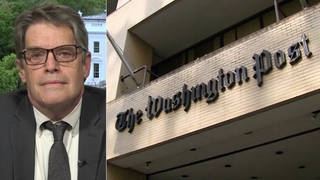
Topics
Imagine a country where one person runs the largest TV network, the largest radio conglomerate, the largest newspaper, and the largest Internet company in the country.
I’m not talking about Russia or China.
I’m talking about here and now, in the United States.
Right now, the Federal Communications Commission is engaged in what it characterizes as the most comprehensive review of media ownership rules ever undertaken by the FCC.
The six rules under review include the ban on broadcasters owning television stations that reach more than 35 per cent of the country, the prohibition of mergers between the four largest TV networks and the prohibition from owning a newspaper and broadcast outlet in the same market.
If those rules are scrapped, a single CEO could theoretically own all of the largest media outlets in the country.
The FCC is holding a daylong public forum at Columbia University on this issue today.
Most analysts believe it may already be too late to stop this from happening. Driving the review is FCC chair Michael Powell, son of Secretary of State General Powell. Powell strongly supported the AOL/Time-Warner merger (after the merger, his father saw his stock options in the company skyrocket from $6 million to nearly $10 million). Michael Powell has admitted he doesn’t know what “public interest” means. He has argued that the rise of alternative media sources such as the Internet has made many of the rules obsolete, and says an overhaul of the rules “is long overdue.”
Powell has the backing of the courts. Last year, a federal appeals court in Washington ordered the FCC to reconsider the 35 per cent limit on station ownership and its rule that prevents a single company from owning more than one television station in a small or medium-size market. The same court has struck down a ban that prevented cable companies from owning TV stations in their markets and threw out limits that prohibited cable companies from controlling more than 30 per cent of US cable systems.
There are other powerful forces at play. Corporations pressuring the FCC include:
*AOL Time Warner, which in addition to AOL and Time magazine owns HBO, CNN, and dozens of magazines
*General Electric, Disney and Viacom, which own NBC, ABC and CBS respectively
*Rupert Murdoch’s News Corp., which owns Fox News and many other outlets
But there is significant opposition.
At a Senate hearing earlier this week, the FCC was slammed from all sides.
Democratic Senator Byron Dorgan from North Dakota told the five FCC commissioners: “We’re heading exactly in the wrong direction in these areas you need to have your foot on the break not your hand on the throttle.”
Democratic Senator from California Barbara Boxer agreed: “We could have a situation where just a couple of countries own all the news outlets. That’s not healthy.”
Even conservative Republican Trent Lott weighed, saying he was worried about the “deterioration” of localism.
In addition, one FCC Commissioner, Michael Copps, is so incensed by the direction Michael Powell is taking that he organizing a public hearing on the issue, today in New York City. Powell and the other Commissioners initially declined to attend, but in the last few days have bowed to public pressure.
Guests:
- Juan Gonzalez, Democracy Now co-host reporting live from the FCC hearing where he was to testify as the president of the National Association of Hispanic Journalists.
- Linda Foley, president of the Newspaper Guild-Communications Workers of America.
- Florence Rice, president of the Harlem Consumer Education Committee.
- Michael Copps, FCC Commissioner, recorded on Jan. 15.
- Mark Crispin Miller, Professor of Media Studies at NYU.
- Pete Tridish, media activist with Prometheus Radio Project.
- John Connolly, National President of the American Federation of Television and Radio Artists.
- Michael Powell, FCC chairman, broadcast live from the FCC hearing.
- Michael Copps, FCC Commissioner, broadcast live from the FCC hearing.












Media Options